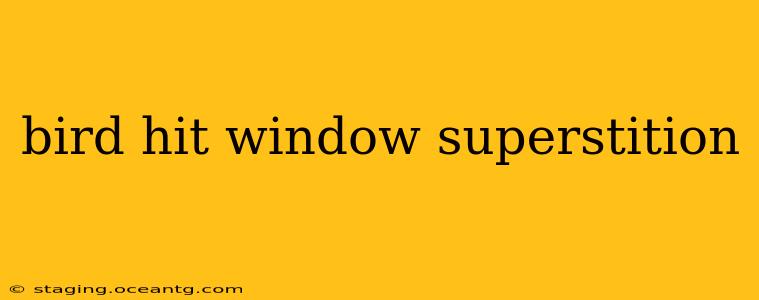For centuries, the sight of a bird striking a window has been shrouded in superstition and folklore. Across various cultures, this seemingly innocuous event carries symbolic weight, often interpreted as an omen of good or bad luck. But what's the truth behind these beliefs, and what do they mean in the context of modern life? Let's delve into the fascinating world of bird-window collisions and the superstitions surrounding them.
What does it mean when a bird hits your window?
The meaning attributed to a bird hitting a window varies significantly depending on cultural beliefs and personal interpretations. In some traditions, it's seen as a harbinger of death or misfortune, a sign that someone close may be in danger or even pass away. Others view it as a message from a departed loved one, a spiritual visit, or a warning to pay attention to something important in your life. Still others might simply see it as a random, unfortunate event with no deeper significance.
Is it bad luck if a bird hits your window?
The idea that a bird hitting a window is bad luck is prevalent in many cultures. However, it's crucial to remember that this is purely superstition. There's no scientific evidence to support this claim. While the impact can be traumatic for the bird, the event itself doesn't inherently predict negative events in human lives.
What does it mean spiritually when a bird hits a window?
Spiritual interpretations often focus on the bird's symbolism. Different bird species hold different meanings across various belief systems. For example, a cardinal might be seen as a symbol of hope and new beginnings, while a raven might be associated with messages from the other side or impending change. Therefore, the spiritual meaning associated with a bird hitting a window is heavily reliant on the specific bird species involved and the individual's spiritual beliefs.
What to do if a bird hits your window?
If a bird hits your window, your immediate concern should be the bird's well-being. Check for injuries. If the bird seems dazed or injured, gently place it in a cardboard box lined with soft material, away from noise and light. Contact a local wildlife rehabilitation center or animal rescue organization for guidance. Do not attempt to handle the bird without proper training, as you could unintentionally cause further harm.
Why do birds hit windows?
Birds often collide with windows due to their inability to perceive glass as a solid barrier. They see the reflection of the sky or trees and fly directly into it. This is particularly prevalent with larger windows and those that reflect the surroundings clearly. The phenomenon is intensified by clear, sunny days and the presence of nearby trees or vegetation.
How can I prevent birds from hitting my windows?
There are several ways to prevent bird collisions with windows:
- Bird-friendly window decals or stickers: These can disrupt the bird's vision and prevent them from flying into the glass.
- Window film: Similar to decals, window films can alter the reflectivity of the glass, making it more visible to birds.
- Vertical blinds or curtains: These can also break up the reflection and make windows more visible to birds.
- External landscaping: Planting tall shrubs or trees near windows can also help by providing a visible barrier.
By taking preventative measures, you can significantly reduce the risk of bird collisions and contribute to their well-being. Remember, the superstition surrounding these events should not overshadow the importance of protecting these creatures and understanding their behavior.
In conclusion, while the superstition of a bird hitting a window remains prevalent, it’s essential to separate folklore from factual understanding. Focusing on bird safety and welfare should always take precedence over any perceived omens. The next time you see a bird strike a window, prioritize its well-being, and consider implementing measures to prevent future incidents. By understanding both the myth and the reality, we can cultivate a more compassionate and informed approach towards avian wildlife.
